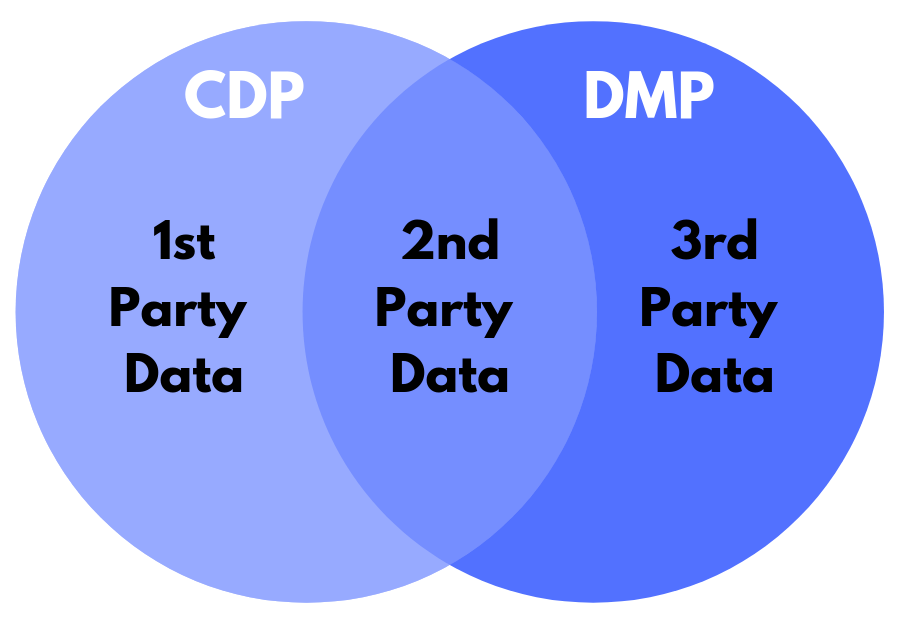In the realm of digital marketing, data is king. With the proliferation of digital channels, businesses have access to a massive trove of information about consumer behavior. Two key tools for managing and leveraging this data are Customer Data Platforms (CDP) and Data Management Platforms (DMP). These platforms, while similar in some ways, serve distinctly different purposes and are used in unique ways to support marketing strategies.

CDP: A Personalized Approach to Data
Defining a Customer Data Platform
A Customer Data Platform (CDP) is a specialized software that collects, unifies, and organizes customer data from various sources into a single customer profile. The data collected by a CDP can span across a wide array of touchpoints. These can include interactions from websites, mobile apps, emails, customer service interactions, and even offline sources such as in-store purchases or event attendance.

The Significance of CDPs
CDPs are central to personalized marketing strategies, as they provide a comprehensive, 360-degree view of each customer. This view is created by merging data from various touchpoints, resulting in a rich, unified customer profile.
Personalized Marketing
With a CDP, businesses can better understand their customers’ needs, preferences, and behavior patterns. This understanding enables marketers to create highly personalized marketing campaigns. For example, a customer who frequently browses fitness products and reads health-related blogs can be targeted with personalized content and product recommendations related to their interests.
Customer Experience Enhancement
The insights gained from a CDP also help businesses improve customer experiences. For instance, by understanding a customer’s journey across different touchpoints, businesses can identify pain points and optimize processes to improve overall customer satisfaction.
Driving Customer Loyalty and Retention
By facilitating personalized experiences and interactions, CDPs can significantly contribute to customer loyalty and retention. A customer who consistently receives relevant, personalized content is more likely to continue engaging with the brand and become a repeat purchaser.
DMP: A Broad Spectrum Data Tool

Defining a Data Management Platform
A Data Management Platform (DMP) is a platform that primarily collects, organizes, and anonymizes data to be used in digital advertising. DMPs gather information from a range of online sources, such as websites, social media platforms, and digital ads. This data, often in the form of cookies and other tracking technologies, is typically anonymized to respect user privacy.
The Significance of DMPs
DMPs play a pivotal role in digital advertising by providing segmented, anonymized data that can be used for targeted advertising.
Audience Segmentation
DMPs group anonymous data into segments based on shared characteristics such as demographics, interests, and online behavior. These segments can then be targeted with specific digital ads. For instance, a segment of users who frequently visit travel websites might be served ads for airline tickets or hotel deals.
Facilitating Programmatic Advertising
DMPs also facilitate the buying and selling of this anonymized data, making them a crucial player in programmatic advertising. Advertisers can access these audience segments to target their ads effectively, while publishers can monetize their audience data by making it available to potential advertisers.
Enhancing Ad Relevance and Reach
By using DMPs, advertisers can enhance the relevance of their ads and extend their reach. The precise audience segmentation allows for highly targeted ads that resonate with the viewer’s interests and behaviors, increasing the ad’s effectiveness. Moreover, DMPs’ ability to integrate with various advertising platforms expands the potential reach of these targeted ads.
CDP vs DMP: A Comparative Overview
In comparing CDPs and DMPs, there are several key differences to highlight:
| Factor | CDP | DMP |
|---|---|---|
| Data Type | Known, identifiable customer data | Anonymized, third-party data |
| Data Collection | Real-time, from various sources | Primarily from online interactions |
| Data Usage | Personalized marketing campaigns | Targeted digital advertising |
| Data Retention | Long-term storage | Short-term storage |
Choosing Between CDP and DMP
The choice between a CDP and a DMP largely depends on a company’s specific needs and marketing goals. If a business focuses on personalization and customer retention, a CDP would be more fitting. On the other hand, a company that prioritizes digital advertising and audience targeting might benefit more from a DMP.
Conclusion
Navigating the world of data management can be complex, but understanding tools like CDP and DMP can make this task significantly easier. By offering different methods to collect, organize, and utilize data, both platforms have unique strengths that can significantly enhance a company’s digital marketing strategy. The key lies in understanding these differences and choosing the platform that best aligns with your marketing objectives.

